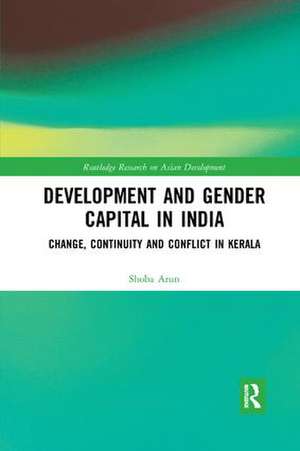Development and Gender Capital in India: Change, Continuity and Conflict in Kerala: Routledge Research on Asian Development
Autor Shoba Arunen Limba Engleză Paperback – 17 ian 2019
Using a Bourdieusian frame of analysis, Development and Gender Capital in India explores the forces of globalisation and how they are embedded within power structures. Through narratives of women’s lived experiences in the private and public domains, it highlights the ‘anomie of gender’ through complexities and contradictions vis-à-vis processes of modernity, development and globalisation. By demonstrating the limits placed upon gender capital by structures of patriarchy and domination, it argues that discussions about the empowered Malayalee women should move from a mere ‘politics of rhetoric and representation’ to a more embedded ‘politics of transformation’, meaningfully taking into account women’s changing roles and identities.
This book will be of interest to scholars and students of Development Studies, Gender Studies, Anthropology and Sociology.
| Toate formatele și edițiile | Preț | Express |
|---|---|---|
| Paperback (1) | 416.22 lei 43-57 zile | |
| Taylor & Francis – 17 ian 2019 | 416.22 lei 43-57 zile | |
| Hardback (1) | 1003.43 lei 43-57 zile | |
| Taylor & Francis – 4 oct 2017 | 1003.43 lei 43-57 zile |
Preț: 416.22 lei
Nou
Puncte Express: 624
Preț estimativ în valută:
79.67€ • 86.57$ • 66.97£
79.67€ • 86.57$ • 66.97£
Carte tipărită la comandă
Livrare economică 21 aprilie-05 mai
Preluare comenzi: 021 569.72.76
Specificații
ISBN-13: 9780367209230
ISBN-10: 0367209233
Pagini: 186
Dimensiuni: 156 x 234 x 10 mm
Greutate: 0.45 kg
Ediția:1
Editura: Taylor & Francis
Colecția Routledge
Seria Routledge Research on Asian Development
Locul publicării:Oxford, United Kingdom
ISBN-10: 0367209233
Pagini: 186
Dimensiuni: 156 x 234 x 10 mm
Greutate: 0.45 kg
Ediția:1
Editura: Taylor & Francis
Colecția Routledge
Seria Routledge Research on Asian Development
Locul publicării:Oxford, United Kingdom
Public țintă
Postgraduate and UndergraduateCuprins
1. Introduction 2. Gender and Development: A Bourdieusian Framework 3. Situating Gender Capital in Kerala 4. Matriliny and Kinship: Transforming Gendered Habitus 5. ICTs and Gender Capital at Work 6. Migrating Gendered Capital 7. Victimization, Symbolic Violence and Complicity 8. Legitimate Capital and the Adivasi Deficit 9. Conclusion
Notă biografică
Shoba Arun is a Senior Lecturer in the Department of Sociology at Manchester Metropolitan University, UK.
Recenzii
Kerala has long been viewed as a model of development and particularly for its achievements in gender equality and women’s empowerment. In this important new book Shoba Arun challenges this simplistic narrative. By applying a Bourdieusian gender capital framework she reveals ways in which patriarchical social structures constrain women’s social and economic roles. Arun’s deep scholarship makes this essential reading for anyone seeking to understand how Kerala really works."
David Hulme, Global Development Institute, The University of Manchester
An extraordinary account about the interaction of development policy and the role of women. By constructing that role in terms of "gender capital," Shoba Arun gives us a different type of analysis. From all the negatives in women’s situation she succeeds in extracting a significant positive. This move brings women’s talents and hard work to the fore and should lead to changed policies.
Saskia Sassen, Columbia University
This is an important book on the welfare of women in India, in particular Kerala, with particular reference to how global and social processes value and devalue forms of gender capital (such as migration, work, neoliberal practices) in local contexts. The rising levels of violence against women in Kerala lead Dr. Arun to reassess the structure of gender relations in a state which is often upheld as a model of social development. The readership of this thoughtful and provocative book would extend beyond feminist sociology into the areas of development and global studies.
Vani Borooah, Emeritus Professor of Applied Economics, University of Ulster
David Hulme, Global Development Institute, The University of Manchester
An extraordinary account about the interaction of development policy and the role of women. By constructing that role in terms of "gender capital," Shoba Arun gives us a different type of analysis. From all the negatives in women’s situation she succeeds in extracting a significant positive. This move brings women’s talents and hard work to the fore and should lead to changed policies.
Saskia Sassen, Columbia University
This is an important book on the welfare of women in India, in particular Kerala, with particular reference to how global and social processes value and devalue forms of gender capital (such as migration, work, neoliberal practices) in local contexts. The rising levels of violence against women in Kerala lead Dr. Arun to reassess the structure of gender relations in a state which is often upheld as a model of social development. The readership of this thoughtful and provocative book would extend beyond feminist sociology into the areas of development and global studies.
Vani Borooah, Emeritus Professor of Applied Economics, University of Ulster
Descriere
Using Kerala as a model, this book explores the forces of globalisation and how they are embedded within power structures. Through narratives of women’s lived experiences in the private and public domains, it highlights the ‘anomie of gender’ through complexities and contradictions via processes of modernity, development and globalisation.









